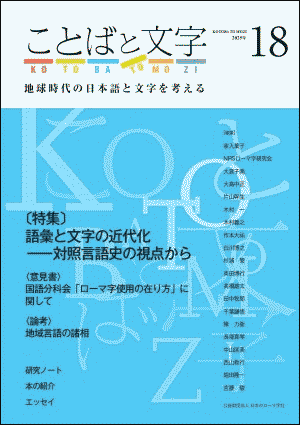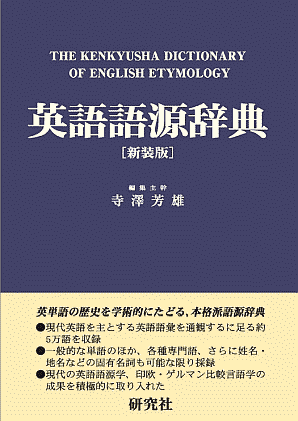2026-02-21 Sat
■ #6144. 「混種語」で大喜利をしました [word_play][hybrid][word_formation][morphology][lexicology][japanese][twitter][loan_word][borrowing][contact][notice][kochushoho][kenkyusha][kochukoneta30][hel_ogiri]
先日ご紹介した「#6133. 日英語の「語彙の3層構造」で大喜利をしました」 ([2026-02-10-1]) に引き続き,2月8日(日)に私の X アカウント @chariderryu にて,おもしろい混種語 (hybrid) を寄せてくださいという趣旨のお題を立てて,呼びかけました.ちょうど『古英語・中英語初歩〈新装復刊〉』のカウントダウン企画「古中英語30連発」の No. 14 として「英語も日本語もちゃんぽん(雑種語)がお好き?」と投稿した直後のことでした.
中英語からの例として,英・語幹 + 仏・接尾辞 = goddess (女神),仏・語幹 + 英・接尾辞 = beautiful (美しい),仏・語幹 + 英・語幹 = court house (裁判所庁舎)を挙げつつ,このような混種語で,おもしろい例が,英語にも,そしてとりわけ日本語にもたくさんあるので,皆さんに出していただこうと考えた次第です.集まってきた例は,事実上すべて日本語からの例でしたが,唸らされるようなおもしろい例をたくさん挙げてくださいました.ありがとうございます.以下,独断と偏見で傑作選を掲載します.
【 食物・料理部門 】
・ カレー南蛮そば
・ ツナおろしキムチ和風パスタ
・ うにいくら濃厚クリームパスタ
・ 生バウムケーキショコラクリーム
・ 生チョコトリュフ芳醇ミルクティー(ブルボン)
・ タンドリーチキンブルゴーニュ風パイ包み焼き
【 場所の名前部門 】
・ 横浜アンパンマンこどもミュージアム
・ 白浜エネルギーランド海ゲート駐車場
【 その他,商品名等 】
・ カラオケ大会
・ 京都サンガF.C.
・ キッチン収納棚
・ ドモホルンリンクル
・ サマージャンボ宝くじ
・ スーパーエネルギー回収
・ 仲良しアベック専用シート
・ ルスツリゾートゴンドラリフト券
・ 反復学習ソフト付き正規表現書き方ドリル(技術評論社)
・ クライネ・ソプラニーノ・リコーダー・奏者
【 英語より特別部門:「希羅希羅ネーム」(ギリシア語とラテン語の混種語) 】
・ pseudo-science
・ finalize
・ television
・ sociology
【 大喜利に参加できなかった残念な語 】
・ バカ旦那
思ったよりも日常は混種語にあふれていますね.お寄せくださった皆さん,ありがとうございました.
本記事と同じ趣旨で,2月17日の heldio にて「#1724. 日英語「混種語大喜利」 --- 皆さんからの傑作選を発表」をお届けしました.ぜひそちらもお聴きいただければ.
・ 市河 三喜,松浪 有 『古英語・中英語初歩〈新装復刊〉』 研究社,2026年.
2025-08-08 Fri
■ #5947. 日本語において接続詞とは? (3) --- 語形成 [japanese][conjunction][terminology][word_formation][morphology][etymology][greek][pos][adverb]
一昨日,昨日と,日本語の接続詞 (subjunctive) について『日本語文法大辞典』を参照してきた.今回は,同文献より日本語の接続詞の語形成について概観する (387--88) .
接続詞を語構成的に見ると,他の品詞から転成したもの(動詞=及び,副詞=また・なお,助詞=が・けれども),動詞や名詞や指示語に助詞が下接して慣用的に固定したもの(すると・しかるに・しかし・さて・ゆえに・ところで)などである.古代語でも,本来的な接続詞といえる語はほとんどない.つまり,もともと日本語では接続詞が発達しなかったけれども,時代がさがるにつれて,事柄相互を情緒的に続ける表現を避けて,分析的に対象化した素材を論理的に関連づけようとす傾向が生まれ,この過程で,種々の後の転成や連語化によって接続詞をつくり出したと考えられる.
日本語の接続詞には,もともとの純然たる接続詞はなく,あくまで他品詞語から派生したものが多いということだ.この事情は,英語の接続詞においても同じである.最も基本的な接続詞といってよい and ですら,印欧祖語で "in" を意味する *en に由来するというのだから,示唆に富む.
西洋の伝統において,接続詞は古典ギリシア語文法において独立した品詞として認められており,歴史を通じて最も盤石な品詞の1つといってよい.しかし,その起源となると,意外と他の品詞の語などから派生的に生じてきたものにすぎないことも分かってくる.改めて接続詞は不思議でおもしろい.
日本語文法の話題に戻るが,接続詞を認めずに,それを副詞の一種としてとらえる文法論もあったことは銘記しておきたい.例えば,山田孝雄や松下大三郎は,接続詞という品詞を認めていない.しかし,学校文法では,接続詞は「それ自体の意味内容が稀薄で,先行する表現の意味を受けて後行する表現に関係づけるという,副詞に無い機能が認められる」等の理由から,独立した品詞として認めている(同著,p. 387).
・ 山口 明穂・秋本 守英(編) 『日本語文法大辞典』 明治書院,2001年.
2025-05-03 Sat
■ #5850. 英語語彙史概論の講義内容を NotebookLM でポッドキャスト対談に仕立て上げました [ai][notebooklm][hel_education][vocabulary][lexicology][borrowing][loan_word][word_formation][derivation][compound][shortening][notice][youtube]
昨日の記事「#5849. Helvillian 5月号について語るAI音声対談」 ([2025-05-02-1]) で,Google NotebookLM の最新の音声対談化サービスを紹介した.あまりに革新的で便利,かつ応用可能性も広そうなので,いろいろといじって遊んでいるところである.
以前,英語語彙史概論の講義を行なったときの講義資料を Google NotebookLM に投げ込み,雑なプロンプトで音声対談生成を依頼した.待つこと数分.出力された音声ファイルを確認すると,改めて驚いたが,ほぼこのまま外に出せる出来映えだ.6分42秒ほどの対談に,90分講義のエッセンスが詰まっていた.
この驚きの対談とそれを紹介する音声配信を,本日 stand.fm の「英語史つぶやきチャンネル (heltalk)」より「英語語彙史概論 by NotebookLM」として公開した.さらにそこから YouTube 化(静止画像付き)でも配信したが,それが上掲の動画である(感激のコメント等を含めて11分29秒).
詳細な情報を対談という形式に落とし込める生成AIの技術は,情報の収集や理解にとどまらず一般の学びにも大きく貢献する可能性がある.日々英語史の音声配信をしている者として,脅威でもあるが大きな希望でもある.活用法と注意点を本格的に探っていきたい.
2025-04-30 Wed
■ #5847.英語史におけるギリシア借用語の位置づけ --- 近刊『ことばと文字』18号の特集より [greek][lexicology][neologism][scientific_name][scientific_english][word_formation][emode][contrastive_language_history][inkhorn_term][combining_form][compound][prefix][suffix]

上掲の雑誌が4月25日に刊行された.この雑誌と,そのなかでの特集企画については,「#5824. 近刊『ことばと文字』18号の特集「語彙と文字の近代化 --- 対照言語史の視点から」」 ([2025-04-07-1]) および「#5845. 『ことばと文字』特集「対照言語史から見た語彙と文字の近代化」の各論考の概要をご紹介」 ([2025-04-28-1]) で紹介した通りである.私も特集へ1編の論考を寄稿しており,そのタイトルは「英語語彙の近代化 --- 英語史におけるギリシア借用語」である.以下に粗々の要約を示す.
1. はじめに
本稿では英語語彙史におけるギリシア語の影響を論じる.英語語彙は長い歴史の中で多くの言語から影響を受けてきたが,なかでもギリシア語からの借用は特異な位置を占めている.特に学術用語や科学技術用語において,ギリシア語の影響は現代に至るまで続いている.
2. 英語のギリシア語との出会い
英語とギリシア語の本格的な出会いは15世紀に遡る.それまでもラテン語を介した間接的な借用はあったが,直接的な借用は極めて限られていた.15世紀になると,ルネサンスの影響で古典への関心が高まり,イングランドでもギリシア語の学習が広まった.
1453年のコンスタンティノープル陥落後,多くのギリシア語学者が西欧に亡命し,ギリシア語との接触機会が増加したことも背景にある.この時期の借用語には,哲学,医学,文法などの分野の専門用語が多く含まれていた.
3. 初期近代英語期のギリシア語からの借用後
16世紀から18世紀にかけての初期近代英語期は,英語の語彙が大きく拡大した時期である.この時期,ギリシア語からの借用も飛躍的に増加した.
特徴的なのは,「インク壺語」(inkhorn_term) と呼ばれる過度に学術的で難解な語彙の出現である.これらは主に学者や文人によって使用され,一般の人々には理解が困難であった.たとえば,adjuvate (援助する), deruncinate (除草する)などの語は現代英語には残っていないが,confidence (信頼), education (教育), encyclopedia (百科事典)などの重要な単語もこの時期に導入された.
また,ギリシア語由来の接頭辞(anti-, hyper-, proto- など)や接尾辞(-ism, -ize など)が英語の語形成のために取り入れられたことも重要である.これらの接辞は,近現代にかけて新しい概念を表現するための強力な道具となった.
4. 学術用語と新古典主義複合語
19世紀に入ると,科学技術の発展に伴い,ギリシア語要素を用いた新語の語形成が活発化した.
学問分野を表す -ic/-ics/-logy 接尾辞(例:rhetoric, economics, philology など)が普及し,多くの新しい学問分野の名称に採用された.また,連結形(combining_form)を活用した造語法も確立された.例えば,tele- (遠い)+ -phone (音)→ telephone, micro- (小さい)+ -scope (見る)→ microscope など,当時の最先端技術を表す用語がこの方法で作られた.
動詞を作る -ize/-ise 接尾辞(例:internationalize, modernize など)や,思想や主義を表す -ism 接尾辞(例:capitalism, socialism など)も広く用いられるようになった.
このギリシア語要素を用いた造語法は,国際的にも受け入れられ,科学の国際化に大きく貢献した.その理由としては,語形成の柔軟さ,国際性,中立性,伝統,精密性,体系性などが挙げられる.
5. 近現代語の共有財産として
現代では,ギリシア語由来の語彙や語形成は英語のみならず多くの言語に共有される国際的な資源となっている.例えば,cardiology (心臓学), neurology (神経学), psychology (心理学)などの用語は世界中で共通して使用されている.
近年のコンピュータ科学や情報技術の分野でも,cyber- (サイバー), tele- (遠隔), crypto- (暗号)などのギリシア語由来の連結形は重要な役割を果たしている.
また,日常語彙にも anti- (反), hyper- (超), mega- (巨大), -phobia (恐怖症), -mania (熱狂)などのギリシア語由来の接頭辞や接尾辞が深く浸透している.
このように,ギリシア語の影響は英語の歴史を通じて継続的に見られるが,特に近代以降,科学技術の発展と国際化の中で重要性を増してきた.今後も,新しい概念や技術の出現に伴い,ギリシア語要素を用いた造語は続くことであろう.
6. おわりに
英語語彙の近代化におけるギリシア語の役割は,言語学的にも文化史的にも重要な研究テーマであり続けるだろう.
論文では,より多くの単語例と図を組み込みながら論じている.脚注では日中独仏語(史)を専門とする他の執筆者からの対照言語史的な「ツッコミ」も計12件入っており,執筆者自身にとっても学べることが多かった.ぜひお読みいただければ.
・ 堀田 隆一「英語語彙の近代化 --- 英語史におけるギリシア借用語」 特集「語彙と文字の近代化 --- 対照言語史の視点から」(田中 牧郎・高田 博行・堀田 隆一(編)) 『ことばと文字18号:地球時代の日本語と文字を考える』(日本のローマ字社(編)) くろしお出版,2024年4月25日.62--73頁.
2025-04-10 Thu
■ #5827. 英語史におけるギリシア借用語の位置づけ --- 拙論をマインドマップ化 [greek][lexicology][neologism][scientific_name][scientific_english][word_formation][emode][contrastive_language_history][inkhorn_term][combining_form][compound][mindmap]

4月7日の記事「#5824. 近刊『ことばと文字』18号の特集「語彙と文字の近代化 --- 対照言語史の視点から」」 ([2025-04-07-1]) で紹介した特集へ,私も一編の論考を寄稿しています.テーマは「英語語彙の近代化 --- 英語史におけるギリシア借用語」です.以下に内容をマインドマップ化したものを示します(画像としてはこちらをどうぞ).
英語史におけるギリシア語の位置づけは,ラテン語,フランス語,古ノルド語などに比べるとマイナー感のある話題かもしれませんが,掘り下げてみるとおもしろいです.ぜひご注目ください.
・ 堀田 隆一「英語語彙の近代化 --- 英語史におけるギリシア借用語」 特集「語彙と文字の近代化 --- 対照言語史の視点から」(田中 牧郎・高田 博行・堀田 隆一(編)) 『ことばと文字18号:地球時代の日本語と文字を考える』(日本のローマ字社(編)) くろしお出版,2024年4月25日.62--73頁.
[ 固定リンク | 印刷用ページ ]
2025-03-21 Fri
■ #5807. 「英語の語形成と語彙史を知ろう」 --- 大修館書店『英語教育』4月号の拙記事を紹介 [notice][vocabulary][lexicology][word_formation][morphology][hel_education][asacul][voicy][heldio][hel_education]

3月14日に発売された『英語教育』(大修館書店)の4月号に,第1特集として「新年度に見直したい英語語彙指導」が取り上げられています.その特集のなかで「英語の語形成と語彙史を知ろう」と題する見開き2頁の記事を執筆しました.記事は以下の4節からなっています.
1. 英語語彙の3分の2が借用語
2. 新語導入の「四則計算」
3. 英語史の各時代で好まれた方法
4. 英語史の知見を語彙学習に
実はこの節立ては,先日最終回を終えたばかりの朝日カルチャーセンター新宿教室のシリーズ講座「語源辞典でたどる英語史」の大雑把な要約となっています.朝カルシリーズの締めくくりの時期と本記事の原稿締切が近かったので,英語語彙史について考えてきた今年度を大きく振り返ってみたいという事情もあり,このような記事となりました.
とりわけ第2節の新語導入に関する「四則計算」は,英語(のみながら言語一般)の語形成をうまくまとめられているのではないかと考えています.ぜひ注目していただければ.「四則計算」の比喩については,最近では「#5774. 朝カルシリーズ講座の第11回「英語史からみる現代の新語」をマインドマップ化してみました」 ([2025-02-16-1]) で触れていますし,実は同雑誌『英語教育』の2020年2月号でも関連記事を書かせていただいています.「#3917. 『英語教育』の連載第11回「なぜ英語には省略語が多いのか」」 ([2020-01-17-1]) をご参照ください.
さて,今回の雑誌記事は最新号の第1特集「新年度に見直したい英語語彙指導」の1部として執筆しましたが,特集内の記事を一覧してみましょう.
1. 教室でできる語彙指導 4つのポイント
2. 英語定型表現の指導 --- You shall know a word by the company it keeps!
3. 高校での語彙指導 --- 「論理・表現」での実践例
4. 中学校の教室場面で行う語彙指導の工夫
5. 児童に教えるべき語彙知識とその指導方法とは
6. Teaching Assistant としての生成AIを語彙指導に活かす
7. Web アプリでデザインする語彙学習アクティビティ
8. 英語の語形成と語彙史を知ろう
本特集は英語教育者・学習者にとって実践的なヒントが満載です.新年度を迎えるにあたって,ぜひ見直してみてください.
今回ご紹介した拙記事「英語の語形成と語彙史を知ろう」については,heldio でも「#1387. 大修館書店『英語教育』4月号で「英語の語形成と語彙史を知ろう」を書かせていただきました」としてお話ししています.ぜひお聴きいただければ.
・ 堀田 隆一 「第1特集 新年度に見直したい英語語彙指導 --- 英語の語形成と語彙史を知ろう」 『英語教育』(大修館) 2025年4月号,2025年.30--31頁.
2025-03-10 Mon
■ #5796. ghost word を OED で引いてみた [lexicography][word_formation][folk_etymology][ghost_word][terminology]
昨日の記事「#5795. ghost word 再訪」 ([2025-03-09-1]) で取り上げた興味深い語彙的現象について,もう少し追いかけたい.OED に ghost word (NOUN) が立項されているので引用しよう.
A word or word form that has come into existence by error rather than established usage, e.g. as a result of a typographical error, the incorrect transcription of a manuscript, an incorrect definition in a dictionary, etc.
1887 Report upon 'Ghost-words', or Words which have no real Existence... We should jealously guard against all chances of giving any undeserved record of words which had never any real existence, being mere coinages due to the blunders of printers or scribes, or to the perfervid imaginations of ignorant or blundering editors. (W. W. Skeat in Transactions of Philological Society 1885--7 vol. 20 350)
1888 The word meant is estures, bad spelling of estres; and eftures is a ghost-word. (W. W. Skeat in Notes & Queries 30 June 504/1)
1977 He [sc. Murray] found a special class of ‘ghost words’, misspelled or ill-defined items that had been admitted to some previous dictionary, thus undergoing an illegitimate birth. (Time 26 December 54/2)
2019 The project will uncover previously unrecorded words, excise ghost words and suggest new or revised definitions. (TendersInfo (Nexis) 21 May)
ghost word の栄えある初例は1887年の Skeat のもので,これは「#2725. ghost word」 ([2016-10-12-1]) でも引用した通りである.いずれにしても緩い定義なので緩く付き合っていくのがよさそうな用語だが,あまりに魅力的な響きで気になってしまうのは仕方ないのだろうか.このように緩くとった「幽霊語」は,少なくとも英語において(そして推測するに日本語など他の言語においても)思いのほか多いのではないだろうか.
2025-03-09 Sun
■ #5795. ghost word 再訪 [lexicography][word_formation][folk_etymology][ghost_word][terminology]
「#2725. ghost word」 ([2016-10-12-1]) や「#912. 語の定義がなぜ難しいか (3)」 ([2011-10-26-1]) で,この用語に触れてきた.今回は『新英語学辞典』の解説を読んでみよう.
ghost word〔言〕(幽霊語)
Skeat (TPS, 1885--87, II. 350--51) の用語 (OED, s.v. ghost).誤植,書写の誤り,編集者・表現者の思い違いから生じた語で,本来はあるべからざる語のこと.そのありうべからざる語が現実に現われた場合,この語を幽霊語または幽霊形 (ghost form) という.つまり,語源的には不要な字が入るなどして,あるべからざる語形をとっている語(例:aghast, sprightly, island, ye (= the)) も幽霊語であるが,誤解から,本来はないはずの意味を与えられた語も幽霊語である.1) acre (= duel). 'fight an acre' のことを「(イングランドとスコットランド辺境地区で)決闘をする」という意味に解し,acre に duel の意味を与えること.本来は中世ラテン語 acram (= duel) committre の英訳の誤りから生じたもの. 2) in derring do (= in daring to do). Chaucer, Troilus and Criseyde 837 から Spenser が誤解して, derring-do を「勇敢な行動」の意味で用いている.3) bourne (= realm). Shakespeare, Hamlet 3:1:79--80 の The undiscovered country, from whose bourne (= limit) No traveller returns から誤解して fiery realm and airy bourne (= realm)--Keats というとき,この bourne は本来なかった意味で用いられていることになる(Bloomfield, 1933, p. 487).これもまた幽霊語の一種である.
一言でいえば,諸々の事情で「あるべからざる語」が現に存在するようになったものが ghost word(幽霊語)ということになる.日常用語としてはこれで済むかもしれないが,学術的には「あるべからざる語」の定義が必要だろう.どのような条件が成立すれば「あるべき語」なのか,あるいは「あるべからざる語」なのか.
上記の引用では「誤植,書写の誤り,編集者・表現者の思い違い」の3点が挙げられているが,これだけで十分なのだろうか.また,真に「誤り」や「思い違い」が関わっているのどうかを歴史的に確かめることは,どこまで可能なのだろうか.幽霊形,幽霊語義,幽霊綴字などと様々に発展させられそうな概念なだけに,基本的な定義を固めておくことが重要のように考える.
・ 大塚 高信,中島 文雄(監修) 『新英語学辞典』 研究社,1982年.
2025-02-26 Wed
■ #5784. 連結辞 -o- は統語的グループではなく形態的複合を表わす [morphology][compound][greek][latin][word_formation][combining_form][morpheme][vowel][stem][syntax][phrase][connective]
昨日の記事「#5783. ギリシア語の連結辞 (connective) -o- とラテン語の連結辞 -i-」 ([2025-02-25-1]) で取り上げた -o- について,Kruisinga (II. 3, p. 7) が何気なさそうに鋭いことを指摘している.
1587. In literary English there is a formal way of distinguishing compounds from groups: the use of the Greek and Latin suffix -o to the first element:
Anglo-Indian, Anglo-Catholic, the Franco-German war, the Russo-Japanese war.
Of course, this use, though quite common, is of a learned character, clearly contrary to the natural structure of English words.
冒頭の "a formal way of distinguishing compounds from groups" がキモである.単語に相当する要素を2つ並べる場合,形態的に組み合わせると複合語 (compound) となり,統語的に組み合わせると句 (phrase) となる.別の言い方をすると,複合語は1語だが,句は2語である.言語学上の存在の仕方が異なるのだが,形態論的に何が異なるのかと問われると,回答するのに少し時間を要する.
発音してみれば,強勢位置が異なるという例はあるだろう.よく引かれる例でいえば bláckbòard (黒板)は複合語だが,black bóard (黒い板)は句である(cf. 「#4855. 複合語の認定基準 --- blackboard は複合語で black board は句」 ([2022-08-12-1])).綴字でもスペースを空けるか否かという区別がある.しかし,これらは韻律や正書法における区別であり,形態論上の区別というわけではない.複合語と句を分ける形態論上の方法は,意外とないのかもしれない.
逆にそのことに気付かせてくれたのが,上の引用だった.なるほど,連結辞 -o- が2要素間に挿入されていれば,その全体は句ではなく複合語であると判断できる.また,統語的な句を作るときに「つなぎ」として -o- を用いる例は存在しないだろう(少なくとも,思い浮かべられない).すると,連結辞 -o- はすぐれて形態論的な要素であり標識である,ということになる.
・ Kruisinga, E A Handbook of Present-Day English. 4 vols. Groningen, Noordhoff, 1909--11.
2025-02-25 Tue
■ #5783. ギリシア語の連結辞 -o- とラテン語の連結辞 -i- [morphology][compound][greek][latin][word_formation][combining_form][morpheme][vowel][stem][connective]
「#552. combining form」 ([2010-10-31-1]) にて,連結形の形態論上の問題点を挙げた.その (3) で「anthropology は anthrop- と -logy の combining form からなるが,間にはさまっている連結母音 -o- は明確にどちらに属するとはいえず,扱いが難しい」として取り上げた.この -o- というのは何だろうか.
『英語語源辞典』語源を探ると,ギリシア語において合成語(=複合語)の第1要素と第2要素を結ぶ「連結辞」 (connective) とある.さらに正確にいえば,ギリシア語の名詞・形容詞の語幹形成母音にさかのぼる.aristocracy, philosophy, technology にみられる通り,本来はギリシア語要素をつなげるケースに特有だったが,後にラテン語やその他の諸言語の要素を結ぶ場合にも利用されるようになった.
一般の複合語のほか,Anglo-French, Franco-Canadian, Graeco-Latin, Russo-Japanese のように同格関係を表わす複合語 (dvandva) にもよく用いられる.英語の語形成の歴史では,この種の複合語は比較的新しいものであり,小さなギリシア語連結辞 -o- の果たした役割は決して小さくない.これについては「#4449. ギリシア語の英語語形成へのインパクト」 ([2021-07-02-1]) を参照.
同様の連結辞として,ギリシア語ではなくラテン語に由来する -i- もある.英語に入ってきた複合語として omnivorous, pacific, uniform などがある.問題の -i- は最初の2単語については語幹の一部としてあった.しかし,最後の語についてはなかったので,純粋に連結辞として機能していたことになる.
いずれの連結形も古典語に由来し,フランス語を経て,英語にも入ってきた.現代英語における共時的な役割としては「つなぎの母音」ととらえておいてよいだろう.科学用語を中心として広く用いられるようになった偉大なチビ要素である.
・ 寺澤 芳雄(編集主幹) 『英語語源辞典』新装版 研究社,2024年.
2025-02-22 Sat
■ #5780. 古典語に由来する連結形は日本語の被覆形に似ている [morphology][compound][latin][greek][japanese][word_formation][combining_form][terminology][derivation][affixation][morpheme]
昨日の記事「#5779. 連結形は語に対応する拘束形態素である」 ([2025-02-21-1]) で,連結形 (combining_form) に注目した.今回も引き続き注目していくが,『新英語学辞典』の解説を読んでみよう.
combining form 〔文〕(連結形) 複合語,時に派生語を造るときに用いられる拘束的な異形態をいう.英語の本来語では語基 (BASE) と区別がないが,ギリシア語・ラテン語に由来する形態の場合は連結形が独自に存在するのがふつうである.連結上の特徴から見ると前部連結形(例えば philo-)と後部連結形(例えば -sophy)とに分けることができる.接頭辞,接尾辞のような純粋な拘束形式と異なり,連結形は互いにそれら同士で結合したり,あるいは接辞をとることもできる.
おおよそ昨日の記述と重なるが,「英語の本来語では語基 (BASE) と区別がない」の指摘は比較言語学的にも対照言語学的にも興味深い.英語では,古い段階の古英語ですら,語 (word) の単位がかなり明確で,語とは別に語幹 (stem) や語根 (root) を切り出す共時的な動機づけは比較的弱い.
それに対して,ギリシア語やラテン語などの古典語では,英語に比べて屈折がよく残っており,これを反映して,形態的に独立した語とは異なる非独立的な連結形が存在する.
西洋古典語の連結形と関連して思い出されるのは,古代日本語の非独立形あるいは被覆形と呼ばれる形態だ.「#3390. 日本語の i-mutation というべき母音交替」 ([2018-08-08-1]) で導入した通り,例えば「かぜ」(風)と「かざ」(風見),「ふね」(船)と「ふな」(船乗り),「あめ」(雨)と「あま」(雨ごもり)のように,独立形と,複合語を作る際に用いられる非独立形の2系列があった.歴史的には音韻形態論的な変化の結果,2系列が生じたのだが,西洋古典語の連結形についても同じことがいえるかもしれない.
・ 大塚 高信,中島 文雄(監修) 『新英語学辞典』 研究社,1982年.
2025-02-21 Fri
■ #5779. 連結形は語に対応する拘束形態素である [morphology][compound][latin][greek][word_formation][combining_form][terminology][derivation][affixation][morpheme]
接頭辞 (prefix) ぽい,あるいは接尾辞 (suffix) ぽい,それでいてどちらでもないという中途半端な位置づけの形態素 (morpheme) がある.連結形と訳される combining_form である.連結形についての説明や問題点は「#552. combining form」 ([2010-10-31-1]) で触れたとおりだが,『英語学要語辞典』での解説が分かりやすかったので,今回はその項目を引用したい.
combining form 〔言〕(連結形,造語形) 合成語 (COMPOUND) ときに派生語 (DERIVATIVE WORD) の形成に用いられる構成要素をいう.OED で aero- の定義にはじめて用いられたと考えられる.本来はギリシア語・ラテン語系に由来するものが多く,前部連結形(例 philo-)と後部連結形(例 -logy)の2種類がある.連結形は自由形式 (FREE FORM) をなす語 (WORD) の拘束異形態 (bound allomorph) ということができ,本来は独立語として用いられない.しかし,最近では anti (← anti-),graph (← -graph) のような例外的用法も増加している.また,連結形は接頭辞 (PREFIX)・接尾辞 (SUFFIX) に比べて意味が一層具象的であり,連結の関係も通例等位的である.ただし,最近では bio-degradable (= biologically ---) のような例外も認められる.さらに,接頭辞・接尾辞が通例直接互いに連結することがないのに対して,連結形は語や他の連結形のほか,接辞,特に接尾辞と連結することも可能である(例:-morphic (← -morph + -ic),heteroness (← hetero- + -ness)).
「連結形は語に対応する拘束形態素である」という捉え方は,とても分かりやすい.
なお,引用中にある OED への言及についてだが,combining form の項目に初例として以下が掲載されていた.
1884 Gr. ἀερο-, combining form of ἀήρ, ἀέρα
New English Dictionary (OED first edition) at Aero-
・ 寺澤 芳雄(編) 『英語学要語辞典』 研究社,2002年.
2025-02-16 Sun
■ #5774. 朝カルシリーズ講座の第11回「英語史からみる現代の新語」をマインドマップ化してみました [asacul][mindmap][notice][kdee][etymology][hel_education][lexicology][cosmopolitan_vocabulary][pde][word_formation][morphology][neologism][borrowing][loan_word][shortening][link]
2月8日に,今年度の朝日カルチャーセンター新宿教室でのシリーズ講座「語源辞典でたどる英語史」の第11回が開講されました.今回は「英語史からみる現代の新語」と題して,様々な新語導入法を導入しつつ,具体的な現代の新語を紹介しました.また,歴史的な観点から現代英語の新語導入の特殊性に触れました.
現代の新語導入は他言語からの借用 (borrowing) にさほど依存しないという点で,英語史上特異な様相を呈します.一方,現代英語は,短縮 (shortening) という新しい語形成の型を獲得し,それへの依存度を高めてきました.直近100年ほどで,新語導入のトレンドが変わってきたと考えられます.21世紀の英語語彙は,どのように展開していくのでしょうか.
今回の講座は,対面で参加された方がいつも以上に多く,オンラインで参加された方からも質問をいただくなど,活発でインスピレーションに富む回となりました.感謝いたします.第11回の内容を markmap というウェブツールによりマインドマップ化して整理しました(画像としてはこちらからどうぞ).復習用にご参照いただければ.
今回のシリーズ第11回の話題に直接・間接に関わるコンテンツを,hellog と heldio の過去回で取り上げてきましたので,以下をご参照ください.
・ hellog 「#5764. 2月8日(土)の朝カルのシリーズ講座第11回「英語史からみる現代の新語」のご案内」 ([2025-02-06-1])
・ heldio 「#1345. 2月8日(土)の朝カル講座「英語史からみる現代の新語」に向けて」 (2025/02/03)
・ heldio 「#1349. 語根創成 --- ゼロから作る完全に任意の新語をめぐって」 (2025/02/07)
・ heldio 「#1350. CNN English Express 2025年2月号の特集「英語の新語30」」 (2025/02/08)
また,シリーズ過去回のマインドマップについては,以下もご参照ください.
・ 「#5625. 朝カルシリーズ講座の第1回「英語語源辞典を楽しむ」をマインドマップ化してみました」 ([2024-09-20-1])
・ 「#5629. 朝カルシリーズ講座の第2回「英語語彙の歴史を概観する」をマインドマップ化してみました」 ([2024-09-24-1])
・ 「#5631. 朝カルシリーズ講座の第3回「英単語と「グリムの法則」」をマインドマップ化してみました」 ([2024-09-26-1])
・ 「#5639. 朝カルシリーズ講座の第4回「現代の英語に残る古英語の痕跡」をマインドマップ化してみました」 ([2024-10-04-1])
・ 「#5646. 朝カルシリーズ講座の第5回「英語,ラテン語と出会う」をマインドマップ化してみました」 ([2024-10-11-1])
・ 「#5650. 朝カルシリーズ講座の第6回「英語,ヴァイキングの言語と交わる」をマインドマップ化してみました」 ([2024-10-15-1])
・ 「#5669. 朝カルシリーズ講座の第7回「英語,フランス語に侵される」をマインドマップ化してみました」 ([2024-11-03-1])
・ 「#5704. 朝カルシリーズ講座の第8回「英語,オランダ語と交流する」をマインドマップ化してみました」 ([2024-12-08-1])
・ 「#5723. 朝カルシリーズ講座の第9回「英語,ラテン・ギリシア語に憧れる」をマインドマップ化してみました」 ([2024-12-27-1])
・ 「#5760. 朝カルシリーズ講座の第10回「英語,世界の諸言語と接触する」をマインドマップ化してみました」 ([2025-02-02-1])
次回の朝カル講座は.3月15日(土)17:30--19:00に開講予定です.シリーズの最終回となる第12回で,「勘違いから生まれた英単語」と題して,オモシロ語源をもつ英単語を取り上げつつ,英語語彙史を総括する予定です.ご関心のある方は,ぜひ朝日カルチャーセンター新宿教室の「語源辞典でたどる英語史」のページよりお申し込みください.
・ 寺澤 芳雄(編集主幹) 『英語語源辞典』新装版 研究社,2024年.
2025-02-09 Sun
■ #5767. 『CNN English Express』2025年2月号の「特集 英語の新語30」 [voicy][heldio][asacul][neologism][lexicology][word_formation][kikuchi_shota]

菊地翔太先生(専修大学)が1月21日付で公開された最新の note 記事「英語の新語30 ---『CNN English Express 2025年2月号』特集の紹介」に触発されて,同号を入手しました.ちょうど現代英語の新語に関する朝カル講座のための資料を探していたところだったこともあり,特集をありがたく楽しく読むことができました.菊地先生,ありがとうございます! 同誌2月号はこちらより入手できます.
特集で取り上げられた新語30語は雑誌編集部による選定ということで,選定基準は詳しく書かれていませんが,昨年中に多用され,今年も引き続き頻繁に使用されていくだろう単語がピックアップされているものと想定されます.以下の5つの分野で仕分けされています.
【環境・科学・健康】 heat dome, zero-dose, autumn sneezing syndrome, popcorn brain, anthrobot, decel
【経済・ビジネス】 greedflation, neobank, digital twin, employee experience, bag holder, wanderpreneur
【社会・家庭】 situationship, porch piracy, Barbiecore, anti-airport dad, range anxiety, bed rotting
【ネット関係・デジタル関連】 prompt, For You page, ELI5, doomscrolling, chronically online, enshittification
【スラング・若者言葉】 girl dinner, cap, bussin', brat, cash grab, the ick
各表現の解説と例文は,雑誌の特集に直接当たっていただければと思いますが,読者の皆さんは,どれくらいご存じでしたか? 私は多くを知らず,不勉強を思い知らされました.これを機に現代の新語に関心を寄せていきたいと思います.なお,この貴重な情報は,昨日予定通り開講された朝カル講座で活用することができました.
同雑誌との関連では,ちょうど6年前に「#3542. 『CNN English Express』2月号に拙論の英語史特集が掲載されました」 ([2019-01-07-1]) と題して記事を書いています.ぜひそちらもお訪ねください.
・ 「特集 英語の新語30」『CNN English Express』2025年2月号,朝日出版社,2025年.33--43頁.
2025-02-08 Sat
■ #5766. 「好きな英語の接尾辞を教えてください!」 --- 一昨日の heldio 配信回 [suffix][voicy][heldio][helwa][helkatsu][word_formation][morphology][lexicology][affixation]
一昨日の Voicy heldio は「#1348. 好きな英語の接尾辞を教えてください!」と題して,リスナーの皆さんに「推し接尾辞」をコメント欄で寄せてもらう,参加型hel活の回をお届けしました.この2日間で30件ほどのコメントが寄せられ,各リスナーのお気に入りの,あるいは気になる接尾辞が明らかになりつつあります.
そもそも英語の接尾辞 (suffix) って,何があったっけ? という反応が返ってきそうです.その決定版となる一覧はありませんが,本ブログでは以下の記事で接尾辞等を列挙してきたことがありますので,参考にしていただければ.
・ 「#5677. 『語根で覚えるコンパスローズ英単語』の接辞リスト(129種)」 ([2024-11-11-1])
・ 「#1478. 接頭辞と接尾辞」 ([2013-05-14-1])
・ 「#5718. ギリシア語由来の主な接尾辞,接頭辞,連結形」 ([2024-12-22-1])
緩めに定義すれば,接尾辞とは既存の単語の最後に付される何らかの意味・機能をもったパーツとなります(逆に単語の最初に付されるものは接頭辞 (prefix) です).しかし,ものによっては接尾辞なのか,そうでないのかを,形態論や音韻論の観点から厳密に仕分けることが難しいケースもあると思います(この辺りの突っ込んだ話題については,一昨日のプレミアム配信「【英語史の輪 #247】今朝の「推し接尾辞」お題(生配信)」で触れました).
今回はややこしい点は横に置いておき,あたなの好きな接尾辞を1つでも2つでも挙げてもらえれば.コメント欄は常にオープンしていますので,さらに多くの回答が集まってくることを期待しています.
振り返ってみれば,以前にも似たような heldio 企画を楽しんだことがありました.そのときは「推し前置詞」を募ったのですが,以下の通り,おおいに盛り上がりました.
・ 「#5516. あなたの「推し前置詞」は何ですか?」 ([2024-06-03-1])
・ 「#5517. 大学生に尋ねました --- あなたの「推し前置詞」は何ですか?」 ([2024-06-04-1])
・ 「#5578. 「推し前置詞」で盛り上がった helwa 配信回のスレッドを公開」 ([2024-08-04-1])
2025-02-06 Thu
■ #5764. 2月8日(土)の朝カルのシリーズ講座第11回「英語史からみる現代の新語」のご案内 [asacul][notice][kdee][etymology][hel_education][helkatsu][link][lexicology][vocabulary][contact][borrowing][word_formation][compounding][derivation][shortening][loan_word][voicy][heldio]

・ 日時:2月8日(土) 17:30--19:00
・ 場所:朝日カルチャーセンター新宿教室
・ 形式:対面・オンラインのハイブリッド形式(1週間の見逃し配信あり)
・ お申し込み:朝日カルチャーセンターウェブサイトより
今年度の朝カルシリーズ講座「語源辞典でたどる英語史」が,月に一度のペースで順調に進んでいます.主に『英語語源辞典』(研究社)を参照しながら,英語語彙史をたどっていくシリーズです.
明後日2月8日(土)の夕刻に開講される第11回は,「英語史からみる現代の新語」と題して,いよいよ現代英語,すなわち20--21世紀の英語の語彙に焦点を当てます.
現代英語は,新語の洪水とも言える語彙の爆発的増加の時代を迎えています.デジタル技術の発展や社会の急速な変化に伴い,新たな単語や表現が次々と誕生していますが,その背後には歴史的に一貫した語形成の型が存在します.接頭辞や接尾辞の追加による「派生」,複数の単語を組み合わせる「複合」,既存の単語の「短縮」,フレーズの頭文字を取る「頭字語」などです.
今回の講座では,英語史の各時代の傾向にも注意を払いながら,現代英語における新語導入の特徴を浮き彫りにしていきます.特に上述のような語形成の多様な方法に注目し,それらどのように現代社会の変化や文化的潮流を反映しているのかを探ります.これらの語形成のプロセスを理解することは,現代英語の語彙のダイナミズムを読み解く鍵となるはずです.いつものように『英語語源辞典』などを参照しながら進めていきます.
本シリーズ講座の各回は独立していますので,過去回への参加・不参加にかかわらず,今回からご参加いただくこともできます.過去10回分については,各々概要をマインドマップにまとめていますので,以下の記事をご覧ください.
・ 「#5625. 朝カルシリーズ講座の第1回「英語語源辞典を楽しむ」をマインドマップ化してみました」 ([2024-09-20-1])
・ 「#5629. 朝カルシリーズ講座の第2回「英語語彙の歴史を概観する」をマインドマップ化してみました」 ([2024-09-24-1])
・ 「#5631. 朝カルシリーズ講座の第3回「英単語と「グリムの法則」」をマインドマップ化してみました」 ([2024-09-26-1])
・ 「#5639. 朝カルシリーズ講座の第4回「現代の英語に残る古英語の痕跡」をマインドマップ化してみました」 ([2024-10-04-1])
・ 「#5646. 朝カルシリーズ講座の第5回「英語,ラテン語と出会う」をマインドマップ化してみました」 ([2024-10-11-1])
・ 「#5650. 朝カルシリーズ講座の第6回「英語,ヴァイキングの言語と交わる」をマインドマップ化してみました」 ([2024-10-15-1])
・ 「#5669. 朝カルシリーズ講座の第7回「英語,フランス語に侵される」をマインドマップ化してみました」 ([2024-11-03-1])
・ 「#5704. 朝カルシリーズ講座の第8回「英語,オランダ語と交流する」をマインドマップ化してみました」 ([2024-12-08-1])
・ 「#5723. 朝カルシリーズ講座の第9回「英語,ラテン・ギリシア語に憧れる」をマインドマップ化してみました」 ([2024-12-27-1])
・ 「#5760. 朝カルシリーズ講座の第10回「英語,世界の諸言語と接触する」をマインドマップ化してみました」 ([2025-02-02-1])
本講座の詳細とお申し込みはこちらよりどうぞ.『英語語源辞典』(研究社)をお持ちの方は,ぜひ傍らに置きつつ受講いただければと存じます(関連資料を配付しますので,辞典がなくとも受講には問題ありません).

第11回については,Voicy heldio でも「#1345. 2月8日(土)の朝カル講座「英語史からみる現代の新語」に向けて」としてご案内していますので,ぜひお聴きください.
・ 寺澤 芳雄(編集主幹) 『英語語源辞典』新装版 研究社,2024年.
2024-12-26 Thu
■ #5722. Shakespeare は1591--1611年の間にラテン語由来の単語を600語取り込んだ [renaissance][shakespeare][emode][latin][greek][borrowing][loan_word][neologism][statistics][neo-latin][scientific_name][scientific_english][word_formation]
16--17世紀の初期近代英語期は,大部分が英国ルネサンスの最盛期に当たり,古典語(ラテン語とギリシア語)が尊ばれ,そこから大量の単語が英語語彙に取り込まれた時期である.同時代の代表的な文人が Shakespeare なのだが,Durkin によればこの劇作家のみに注目したとしても,短期間に相当数のラテン語由来の新語 ("latinate neologisms") が英語に流入したことが確認されるという.
The peak period of the Literary Renaissance was C.1590--1600. The Primary author was Shakespeare who, between 1591 and 1611, introduced no fewer than six hundred latinate neologisms, fifty-three of which occur in Hamlet alone. Many of these became everyday words, e.g. addiction, assassination, compulsive, domineering, obscene, sanctimonious, traditional. (226--27)
この点で Shakespeare は同時代的に著しい造語力を体現しているといえるが,さらに重要なのは,その後の新古典主義新語ブームに前例を与えたという功績なのではないか.Shakespeare に代表されるルネサンス期に火のついた古典語からの語彙借用の慣習は,続く時代にも勢いが緩まるどころか,むしろ拡張しつつ受け継がれていったからである.Durkin はこう続けている.
After the Renaissance, a vast amount of technical and scientific vocabulary flooded into English from both Greek and Latin, hence words like carnivorous, clitoris, formula, hymen, nucleus. In the next century, Linnaeus [1707--78] introduced numerous biological terms, like chrysanthemums and rhododendron. The Scientific period, which peaked C.1830, featured many Neolatin terms like am(o)eba, bacterium, flagellum. Finally, the modern technical/technological period featured words like floccilation. (227)
これは Shakespeare が英語語彙史上に果たした役割の1つとみてよいだろう.
・ Durkin, Philip. Borrowed Words: A History of Loanwords in English. Oxford: OUP, 2014.
2024-12-23 Mon
■ #5719. ギリシア語が英語に影響を与えた3つの型 [greek][latin][borrowing][loan_word][lexicology][word_formation][derivation][compounding][oe][prestige][combining_form][morphology][scientific_name][scientific_english][link]
ギリシア語が英語に与えた語彙的影響は,ラテン語やフランス語のそれに比べると見劣りするように思われるかもしれないが,実際にはきわめて大きい.語彙そのものというより,むしろ語形成 (word_formation) に与えた影響が大きい,といったほうが適切かもしれない.とりわけ連結形 (combining_form) を用いた科学系の複合語の形成は,ギリシア語の偉大な貢献である.
Durkin (231) は,英語史におけるギリシア語の影響について,広い視野から次のように述べている.
Between C5 and C8-9, the Greek liberal arts education was revived, first by the Ostrogoths, later by the Carolingians, and Greek gained special prestige. Writers liberally sprinkled their woks with Greek words, many of which found their way into other languages of Europe, including Old English. Particularly noteworthy are the glossarial poems from Canterbury with words like apoplexis, liturgia, spasmus. Since then, Greek medical doctrine and the terms associated with it became the major part of English medical lexis . . . . More general scientific vocabulary from Greek has mushroomed since C18 . . . .
. . . .
Greek influence on English, then, is restricted to the lexicon, (limited) derivation, and compounding. Words entered English initially through Roman borrowings, then through direct borrowing from Ancient Greek writers, more recently through word formation (combining roots and affixes) in English.
ギリシア語の英語への影響には,3パターンあるいは3段階があったとまとめてよいだろう.
(1) ラテン語を経由して(中世から)
(2) 直接ギリシア語から(近代以降)
(3) ギリシア語「要素」を用いた英語内での造語(近代以降,特に18世紀以降;「科学用語新古典主義的複合語」 (neo-classical compounds) あるいは「英製希語」と呼んでもよいか)
いずれのパターンについても,ギリシア語に付された威信 (prestige) を反映して学術用語の造語が圧倒的である.関連する話題として,以下の hellog 記事も参照.
・ 「#516. 直接のギリシア語借用は15世紀から」 ([2010-09-25-1])
・ 「#552. combining form」 ([2010-10-31-1])
・ 「#616. 近代英語期の科学語彙の爆発」 ([2011-01-03-1])
・ 「#617. 近代英語期以前の専門5分野の語彙の通時分布」 ([2011-01-04-1])
・ 「#1694. 科学語彙においてギリシア語要素が繁栄した理由」 ([2013-12-16-1])
・ 「#3014. 英語史におけるギリシア語の真の存在感は19世紀から」 ([2017-07-28-1])
・ 「#3013. 19世紀に非難された新古典主義的複合語」 ([2017-07-27-1])
・ 「#3166. 英製希羅語としての科学用語」 ([2017-12-27-1])
・ 「#3179. 「新古典主義的複合語」か「英製羅語」か」 ([2018-01-09-1])
・ 「#3368. 「ラテン語系」語彙借用の時代と経路」 ([2018-07-17-1])
・ 「#4191. 科学用語の意味の諸言語への伝播について」 ([2020-10-17-1])
・ 「#4449. ギリシア語の英語語形成へのインパクト」 ([2021-07-02-1])
・ 「#5718. ギリシア語由来の主な接尾辞,接頭辞,連結形」 ([2024-12-22-1])
・ Durkin, Philip. Borrowed Words: A History of Loanwords in English. Oxford: OUP, 2014.
2024-12-22 Sun
■ #5718. ギリシア語由来の主な接尾辞,接頭辞,連結形 [greek][suffix][prefix][lexicology][word_formation][combining_form][morphology][latin][french][loan_word][borrowing]
Durkin (216--19) にかけて,英語に入ったギリシア語由来の要素が列挙されている.接尾辞 (suffix),接頭辞 (prefix),連結形 (combining_form) に分けて,主たるものを列挙しよう.ラテン語やフランス語からの借用語のなかに混じっている要素もあり,究極的にはギリシア語由来であることが気づかれていないものも含まれているのではないか.
[ 接尾辞 ]
-on (plural -a), -ter, -terion, -ma/-mat- (adj. -matic), the family of -ize/-ise (-ist/-ast, -ism, -asm), -ite, -ess, -oid, -isk, -(t)ic, -istic(al), -astic(al)
[ 接頭辞 ]
a(n)-, amph(i)-, an(a)-, anti-, ap(o)-, cat(a)-/kat(a)-, di(a)-, dys-, a(n)-, end(o)-, exo-, ep(i)-, hyper-, hyp(o)-, met(a)-, par(a)-, peri-, pro-, pros-, syn-/sys-
[ 連結形 ]
acro- "high; of the extremities", agath(o)- "good", all(o)- "other, alternate, distinct", arch- "chief; original", argyr(o)- "silver", aut(o)- "self(-induced); spontaneous", bary-/bar(o)- "heavy; low; internal", brachy- "short", brady- "slow", cac(o)- "bad", chlor(o)- "green; chlorine", chrys(o)- "gold; golden-yellow", cry(o)- "freezing; low-temperature", crypt(o)- "secret; concealed", cyan(o)- "blue", dipl(o)- "twofold, double", dolich(o)- "long", erythr(o)- "red", eu- "good, well", glauc(o)- "bluish-green, grey", gluc(o)- "glucose"/glyc(o)- "sugar; glycerol"/glycy- "sweet", gymn(o)- "naked, bare", heter(o)- "other, different", hol(o)- "whole, entire", homeo- "similar; equal", hom(o)- "same", leuc/k(o)- "white", macro- "(abnormally) large", mega- "huge; very large", megal(o)- "large; grandiose" and -megaly "abnormal enlargement", melan(o)- "black; dark-colored; pigmented", mes(o)- "middle", micr(o)- "(very) small", nano- "one thousand-millionth; extremely small", necr(o)- "dead; death", ne(o)- "new; modified; follower", olig(o)- "few; diminished; retardation", orth(o)- "upright; straight; correct", oxy- "sharp, pointed; keen", pachy- "thick", pan(to)- "all", picr(o)- "bitter", platy- "broad, flat", poikil(o)- "variegated; variable", poly- "much, many", proto- "first", pseud(o)- "false", scler(o)- "hard", soph(o)- and -sophy "skilled; wise", tachy- "swift", tel(e)- "(operating) at a distance", tele(o)- "complete; completely developed", therm(o)- "warm, hot", trachy- "rough"
英語ボキャビルのおともにどうぞ.
・ Durkin, Philip. Borrowed Words: A History of Loanwords in English. Oxford: OUP, 2014.
2024-11-14 Thu
■ #5680. laughter の -ter 語尾 [suffix][noun][word_formation][derivation][lexicology][oed]
laugh (笑う)の名詞形は laughter (笑い)である.動詞から名詞を形成するのに -ter という語尾は珍しい.語源を探ってみても,必ずしも明確なことはわからない.ただし類例がないわけではない.
OED の laughter (NOUN1) によると,語尾の -ter について次のように記述がある.
a Germanic suffix forming nouns also found in e.g. fodder n., murder n.1, laughter n.2, lahter n.
上記の laughter n.2 というのは見慣れないが「鶏の産んだひとまとまりの卵」ほどを意味する.「卵を産む」の意の動詞 lay の名詞形ということだ.
ちなみに『英語語源辞典』で laughter を引くと,slaughter (畜殺;虐殺)が参照されており,「古い名詞語尾」と説明がある.動詞 slay (殺す)に対応する名詞としての slaughter ととらえてよい.
他には food (食物)と関連のある fodder n.(家畜の飼料)や foster n.1(食物)にも,問題の接尾辞が関与しているとの指摘がある.稀な接尾辞であることは確かだ.
・ 寺澤 芳雄(編集主幹) 『英語語源辞典』新装版 研究社,2024年.
Powered by WinChalow1.0rc4 based on chalow